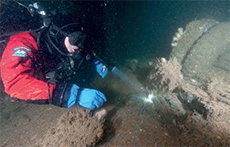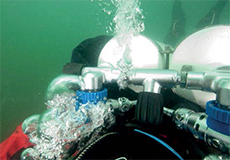




| Home | Features | Club Nights | Underwater Pics | Feedback | Non-Celebrity Diver | Events | 5 August 2025 |
| Blog | Archive | Medical FAQs | Competitions | Travel Offers | The Crew | Contact Us | MDC | LDC |

|

|
 
 |
  ISSUE 19 ARCHIVE - SAFETY CULTUREGareth Lock“Look at that guy, what an idiot, imagine doing that! He's lucky to get away with that. This was a mistake which could have cost him his life but fortunately he spotted it and corrected it before it got too far.”It doesn't matter what the mistake or error was, the chances of him telling anyone else about it and therefore others learning from it, have just been reduced to almost zero. Whilst friendly banter is good, saying something like that to, or about, a stranger or someone you don't know very well, means that a large number of errors/mistakes are not formally reported and, as a consequence 'there isn't a problem with X'. EVERYONE makes mistakes, even world leading divers, those at the top of their game, the sort of people we aspire to be. So if even 'they' make mistakes, there is a very high probability that you or I have made similar mistakes or errors on a dive. Unfortunately, those who didn't recognise the threat or risk until it is was too late are no longer here with us today taking part in a fantastic sport exploring our underwater world. The following are a series of incidents which have ended up as a fatality.
These are all simple mistakes and maybe the sort of thing the readership have done and 'got away with'. If you did make a mistake like this, did you tell anyone or report it to the wider diving community through BSAC or another reporting system such as DISMS? Without knowing how prevalent problems are, and why they occurred, it is very hard for the training agencies to know how much emphasis to place on certain activities during training courses. It is also very hard for divers to accurately quantify the risks they are taking when they 'break the rules'. In addition, before you personally mitigate a risk (in risk management terms, tolerate, treat, transfer or terminate) you need to be able to identify it. Providing an environment where divers, instructors and those involved in management of diving and diver training operations can report honest mistakes and near misses is essential. This environment is one where it is accepted that we all make mistakes due to the limit of our experience, knowledge, training or the situation we are placed in and the reporting of those mistakes or near misses is to be encouraged. But at the same time, it is an environment where negligent or malicious behaviour is not condoned and allowed to continue. This environment is known as a 'Just Culture' environment and is part of the wider 'Safety Culture' that this sport should embrace if we are to reduce the number of injuries and fatalities occurring. The 'Just Culture' aspect: A Safety Culture is not one entity, but rather is made up of a series of component 'Culture' parts. These are an informed Culture, a Reporting Culture, a Learning Culture, a Just Culture, and finally, a Flexible Culture. Informed CultureThe collection and analysis of relevant data and the active dissemination of safety information to all required parties, both inside and outside the organisation. Part of this involves active risks management, ensuring that risks are identified and their mitigations provided. Reporting CultureAn environment in which divers have the confidence and security to report where safety has been compromised without fear of blame or retribution. Divers must know that confidentiality is at the forefront and, importantly, know that something will come of the data that is submitted. Without the latter, use of the system will wither and ultimately die as there is no perceived need. Learning CultureThis is the ability to learn from the mistakes which have been made, make changes in a timely fashion, to improve safety and operational outputs. In diving terms, having more fun, understanding the risks and mitigating them. A learning culture is also fundamental to ensure that divers are aware what the safety management system is and how they can interact with it. Just CultureFundamentally, this boils down to an environment where honest mistakes and errors will not be punished if the error was unintentional. On the other side, those who take unjustifiable risks or act recklessly or negligently will still be subject to disciplinary action. It is not a blame free culture. Flexible CultureThis is where an organisation and its people are capable of adapting effectively to changing demands. As an organisation becomes larger and more unwieldy, then its flexibility is removed. A Just Culture cannot exist on its own, but rather is interlinked with the other cultures. You cannot understand who has done what, when or why without an established reporting culture and you won't get those subjects to report if they think there isn't an issue and don't understand the risks that may occur if the situation conspires against you (informed culture). The puzzle is not complete unless you have a Just Culture as divers will not report an incident if they think they are going to be unjustly or inappropriately blamed for the incident or accident. Finally, a learning culture is required to know more about the risks that are out there, simplistically, glueing the pieces together. Responsibility... personal responsibility.... Looking at the tabloids, you could argue that members of society are now rather than undertaking some sort of 'personal risk assessment'; the so called 'Elf and Safety' culture we live in. Divers can be given training, via a range of agencies and courses, about how to undertake diving safely. During that training, they should be taught to exercise caution, and the implications going beyond their trained limits as they expand their experience and knowledge. Unfortunately, when a diver 'breaks these rules' and something goes wrong, there is a tendency to look for someone to 'blame' for the incident rather than understand why that diver made the mistakes they did. Diving is considered a relatively safe sport given the environment we undertake the sport in, with a fatality rate of approximately 1:200 000 dives per year. However, those figures are not precise with between 10 and 24 fatalities and more than 350 divers treated for DCI each year. In addition, from recently presented material at RF3.0, CCR diving is considered to have a fatality risk between 4 and 10 times that of open circuit diving; this is based on the extremely limited data available and therefore specifics are not possible. Despite these numbers being relatively low, divers need to be aware of the risks they are taking; we are undertaking a sport which cannot be conducted without technical and mechanical life support equipment, and if this fails, there is a risk of death. Partners and family need to know the risks we are taking and, importantly, that human error is the most prevalent root cause of diving fatalities. Mistakes, fortunately, don't always lead to a fatality and much can be learned from non-fatal incidents; the prevalence of these compared to fatalities is likely to be in the order 1:600 based on literature from non-diving environments. Consequently, there needs to be a means by which the outcome and solution can be discussed in an open and non-critical manner, thereby allowing others to learn from this episode. If mistakes aren't corrected, they can become the norm 'because I got away with it', then subsequently turn into bad habits and those bad habits need to be 'checked' in a non-confrontational manner to bring the diver back to 'baseline'. Diving is a fun activity, but these bad habits could be as simple as dragging or dangling equipment, poor buoyancy control or not analysing gas to ensure the MOD is known. If these habits are not 'corrected' by the organisation (organisation could be considered to be the diving community at large), there is implicit acceptance that what they are doing is correct and acceptable. However, there is a real conundrum - there are no rules in diving and therefore deciding what is correct or a ‘bad habit' is hard to define. Furthermore, risk is relative and what I consider risky is not the same as your measure of risk - either absolute or my/your perception of the risk. What YOU can do to help the wider diving community... In the UK there are a couple of reporting systems available to the diving population; the BSAC Incident Report which is open to all divers from all agencies and a summary annual report is produced, and the Diving Incident and Safety Management System (DISMS – www.divingincidents.org) which is an online open and confidential reporting system independent of all agencies and manufacturers. DISMS allows a search to be conducted against the live public dataset producing results there and then, so if data is updated after the annual report (covering 1 Jan – 31 Dec) is published, the revised data can still be accessed. By reporting your incidents and accidents, then the sport will be better informed of the risks that are occurring and training agencies can focus their efforts more accurately. It's your attitude! Simply, safety culture means that we do the safe things all the time, not just when someone is watching or assessing us. A Just Culture is only a part of the wider 'Culture' piece and whilst articles like this can highlight to the diving community what a Just Culture is, it really takes the organisations to actively promote it at the top level so that it cascades down to the Instructor Trainer staff, the Instructors and ultimately the divers themselves. Diving is a recreational activity with limited (rightly so) legislation and consequently, it is much better to encourage and lead by example – more carrots, less sticks! For example, a leading UK rebreather instructor Paul Haynes, has been promoting the use of mouth-piece retaining straps for rebreather users to maintain a gas source if the diver goes unconscious. This has led to an effective campaign on one CCR forum where at least 20 CCR divers have bought them and the subject was added as a consensus position at Rebreather Forum 3.0 this May; a small, simple and cheap change which has the potential to reduce fatalities. A Just Culture does not have to be mutually exclusive with a recreational activity, nor does it have to cost a substantial amount of money to implement. However, what it does require is an attitudinal change within the organisation and those partaking in the sport. Hiding something away because you made a mistake doesn't help anyone, however, concerns about being treated fairly, non-judgementally and that the circumstances are going to be taken into account, need to be addressed before this will be widely adopted. Learn from your mistakes, better still, learn from someone else's. |